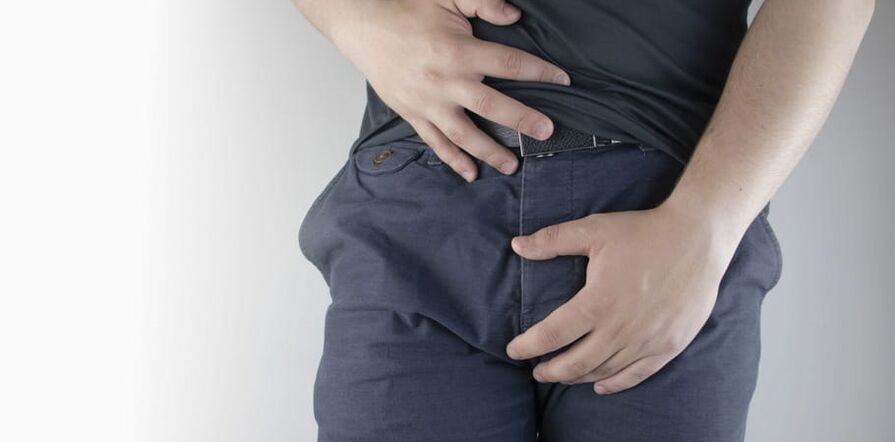For most people, varicose veins only represent a lower extremity pathology. However, blood vessel problems can occur in any part of the body, and intimate areas in both men and women are no exception. Varicose veins of the labia and other organs of the vulva, penis and testicles (varicocele) are particularly troublesome.

causes
The main factor in the development of pathology is a genetic weakness of the vascular wall, in which the veins lose their tone and elasticity. Other provoking causes of varicose veins of the groin organs are:
- Malnutrition with frequent constipation;
- chronic diseases of the genitourinary system;
- intense physical activity with tension in the pelvic muscles and anterior abdominal wall;
- slow blood flow in the groin due to a sedentary lifestyle;
- Compression of blood vessels and blockage of the outflow of venous blood due to blood clots, scars, adhesions, tumors of various origins;
- Changes in the level of hormones during physical maturation, pregnancy, menopause, taking hormonal preparations;
- increased load on the perineum organs in women before and after pregnancy, during childbirth;
- stagnation of blood and compression of the vessels of the small pelvis and perineum due to the growth of the uterus;
- Trauma and surgery of the external genital organs in men and women;
- frequent urinary retention;
- systematic delay in ejaculation;
- frequent hot baths, baths, saunas.
Symptoms
In women, varicose veins affect the labia and other parts of the vulva, in men - the penis, scrotum. Depending on the location, the pathology has similar and different symptoms.
Common ones are:
- spider veins in the early stages;
- dilated inguinal veins protruding into the perineum, firm to the touch with an altered relief, forming grape plexus and nodes at 3-4 degrees of varicose veins;
- bluish skin tone;
- Itching, burning sensation, pain with the development of congestion;
- Bloating;
- Pain during intimate contact, using the toilet, physical exertion.
For varicose veins of the labia and vulva there are also:
- Pain radiating to the lower back or hips, assuming a chronic character, disrupting the normal life of the woman and leading to a deterioration in psycho-emotional state: depression, increased irritability, poor sleep, neuroses.
- Hard and large vascular nodes that make it difficult to sit and move.
Varicose veins of the spermatic cord (varicocele) in men are accompanied by:
- asymmetry, prolapse, swelling of the scrotum on the side of the damaged testicle;
- Discomfort, burning, and pain when walking and with the slightest physical exertion;
- Deterioration in the quality of intimate life up to impotence and infertility.
The defeat of the penis is manifested:
- severe swelling of the veins, even when the patient is at rest;
- painful erection;
- a change in skin color from dark pink to dark red with a bluish tinge;
- Swelling of the soft tissues;
- punctual bleeding and hardening visible under the skin.
What is dangerous
Damage to the inguinal organs can have serious complications and negative consequences: blood thickening in the vessels causes thrombosis, phlebitis, sudden bleeding during sexual intercourse or tension during bowel movements.
Labia and vulva
If left untreated, the disease progresses, which leads to complications:
- Varicothrombophlebitis is one of the forms of thrombophlebitis, which is manifested in the defeat of the superficial vessels of the lower extremities. Causes complications to deep and major veins, pulmonary artery.
- Pelvic thrombosis is the formation of blood clots in the superficial and deep veins that, if torn off, can be fatal.
As medical practice shows, with such a pathology, the development of bleeding rarely occurs, and situations when an inflamed vein burst is rare, but possible, especially during childbirth, therefore, varicose veins of the labia should be treated immediately after diagnosis.
penis
Varicose veins in the penis and spermatic cord lead to a deterioration in the quality of sperm and impaired erectile function. The mental health of the patient also suffers: The changed appearance of masculinity affects the mood, leads to the development of depression and neuroses up to impotence.
treatment
The basis for the treatment of varicose veins is drugs and the elimination of factors that provoke the development of the pathology - proper nutrition, exercise, drinking regime, correction of body weight.
The drugs are prescribed systemically in the form of tablets, capsules, or locally in the form of ointments, creams. The following groups are prescribed: venotonics (phleboprotectors) to strengthen the vascular wall, increase the tone and elasticity of the veins, relieve edema and lymphatic congestion, antiplatelet agents for the resorption of blood clots, NSAIDs to relieve inflammation and pain, antihistamines for itching, burning and others.
Pregnant women are advised to wear compression underwear in the form of stockings or tights (with a bum pocket) for men - a special model of underwear designed to support the testicles and penis in the correct position.
Of the minimally invasive methods, sclerotherapy is recommended - the introduction of special substances into the vessels that clog the damaged areas and the blood flows through healthy veins, as well as laser or radio frequency ablation, which work on a similar principle - seal the affected ship.
Surgical treatment is resorted to only after the birth of a child, if the veins have not returned to a healthy state, that is, the cause of varicose veins is not pregnancy.
In the early stages of the pathology, treatment with alternative methods of therapy is possible: ointments, decoctions of medicinal plants, compresses and baths based on them. Before treating pathologies with alternative methods of therapy, be sure to consult your doctor.














































